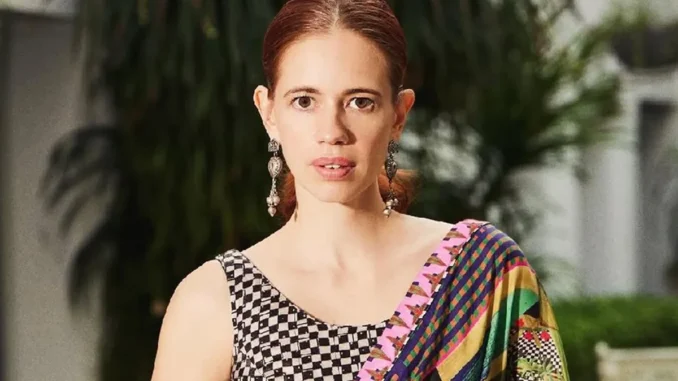
Acclaimed actor and writer Kalki Koechlin, known for her unconventional roles and fearless commentary, has once again stirred an important conversation — this time about the current state of the Hindi film industry. In a candid interview, the Margarita with a Straw star shared her concerns about what she describes as a recession in Bollywood, pointing to a worrying trend of financial insecurity, mass layoffs in creative departments, and a visible lack of original content being greenlit.
Kalki, who has always been one to call out industry shortcomings, expressed dismay at how the once-vibrant storytelling culture of Bollywood appears to be struggling in the face of mounting commercial pressure. “It’s quite evident,” she said. “There is a recession in the film industry. You can see it in how studios are behaving — they’re re-releasing old films, firing creative teams, downsizing staff. It’s a tough time for original voices.”
A Creative Standstill?
Kalki’s remarks reflect a broader sentiment echoed by many insiders — that Bollywood is experiencing not just a financial crunch but a creative one as well. The rise of formulaic blockbusters and star-driven commercial vehicles has pushed nuanced, content-driven stories to the sidelines. According to her, the increased reliance on nostalgia and the re-release of films from the recent past — rather than investing in fresh content — is one of the key signs of an industry grappling with risk aversion.
“You know something is wrong when, instead of launching new scripts or scouting for emerging talent, studios start promoting films they released just a few years ago as ‘classics.’ That’s not homage — that’s fear,” she said, highlighting the hesitation among production houses to take creative risks in an increasingly volatile market.
Budget Cuts and the Cost to Creativity
One of the more alarming aspects Kalki brought to light was the laying off of entire creative teams in several production companies. From in-house writers to development executives, many talented individuals have reportedly lost their jobs in recent months as a cost-cutting measure.
“This is the backbone of filmmaking we’re talking about,” Kalki emphasized. “These are the people who shape stories, build characters, create the emotional world of a film. When you let them go, you’re not just saving money — you’re sacrificing long-term vision.”
Several studios have either put planned projects on indefinite hold or shelved them altogether, choosing instead to focus on low-risk remakes, sequels, or franchise films. Kalki noted that while franchises may bring in short-term returns, they do little to elevate the art of cinema or provide opportunities to new voices.
An Uneven Recovery Post-Pandemic
The pandemic dealt a heavy blow to the Indian film industry, with cinema halls shutting down for months and numerous projects delayed or cancelled. While there was a brief resurgence in theatrical releases following the return of audiences to theaters, Kalki believes that Bollywood has not yet fully recovered from the aftershocks — especially on the creative front.
She noted how the South Indian film industries, in contrast, have adapted and thrived by backing innovative scripts and regional storytelling with global appeal. “Look at what’s happening in Tamil, Telugu, and Malayalam cinema — they’re pushing the envelope with stories, investing in fresh talent, and audiences are responding. There’s something to learn from that,” she said.
A Call for Structural Change
Kalki Koechlin, who has herself worked in both commercial and indie films, emphasized that while financial setbacks are real, the solution cannot lie in stifling creativity or falling back solely on nostalgia. She urged the industry to invest in development, nurture screenwriting talent, and listen more to unconventional creators.
“We need to stop treating cinema as just a business. Yes, it has to be sustainable, but it’s also a cultural force — something that shapes public discourse, reflects society, and inspires change. If we don’t protect the people who create these stories, then what are we left with?” she asked.
Kalki also noted the importance of streaming platforms in supporting experimental content, but warned that even OTTs are beginning to play it safe, greenlighting only those projects with big names attached. “We were seeing a shift, a more democratic approach to storytelling, but that seems to be slowing down as well,” she observed.
Remaining Hopeful Despite the Gloom
Despite painting a fairly grim picture of the industry’s current situation, Kalki Koechlin ended her statement on a note of cautious optimism. She believes that cycles of stagnation are not new to the industry and that it’s in these difficult moments that some of the most powerful stories are born.
“There will always be voices who resist — filmmakers, writers, and performers who choose to speak their truth even when the system doesn’t make it easy. And as long as there’s even one person doing that, there’s hope for the rest of us,” she concluded.
Kalki’s words serve as a timely reminder that beneath the glitz and glamour, Bollywood, like any other industry, is grappling with its share of economic and creative challenges. But with voices like hers urging introspection and reform, there is a chance the industry could reorient itself — not just to survive, but to evolve.



